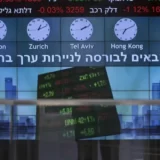McDonald’s CEO Cites Impact of Middle East Conflict and Misinformation on Business
In the wake of the ongoing conflict between Israel and Hamas, McDonald’s Chief Executive Officer, Chris Kempczinski, revealed that the fast-food giant’s business in the Middle East is experiencing significant challenges. The CEO pointed to the impact of the war and what he termed as “misinformation” surrounding the company’s position on the conflict.
In a LinkedIn post on Thursday, Kempczinski addressed the issue, stating that “several markets in the Middle East and some outside the region are experiencing a meaningful business impact due to the war and associated misinformation that is affecting brands like McDonald’s.”
The world’s largest burger chain, along with other major brands such as Starbucks, has become the target of boycotts, allegedly due to their perceived pro-Israeli stance and reported financial ties to Israel.
Kempczinski expressed concern over the situation, labeling it as “disheartening and ill-founded” in his LinkedIn post, which also provided an update on McDonald’s operations. He defended the company’s commitment to local communities, emphasizing that McDonald’s is proudly represented by local owner-operators in every country of operation, including Muslim countries.
The CEO did not provide specific examples of the misinformation he referred to. FOX Business reached out to McDonald’s for additional comments, but there was no immediate response.
In October, McDonald’s Israel posted on social media that it had provided thousands of free meals to Israel Defense Forces personnel. However, this move was disavowed by McDonald’s franchises in some Muslim countries, underscoring the complex dynamics that global corporations navigate during times of regional conflict.
McDonald’s majority franchise-operated locations globally include Middle East locations, falling under the company’s international developmental licensed markets division, contributing approximately 10% of the company’s revenue, according to Bloomberg.
Despite the challenges, Kempczinski emphasized McDonald’s solidarity with communities worldwide and its commitment to standing against hate speech. He also highlighted the company’s history of supporting communities during various crises.
Boycotts against Western brands have extended beyond the Arab region, affecting countries like Egypt, Jordan, and Malaysia. In the latter, McDonald’s Malaysia recently filed a lawsuit against a pro-Palestinian group, accusing it of defamation and loss of earnings resulting from boycotts that allegedly led to profit losses, job cuts, and operational disruptions.
As McDonald’s continues its global expansion plans, aiming to increase its restaurant count by about 8,800 by 2028, the company faces the challenge of navigating geopolitical sensitivities and public sentiment in regions affected by conflicts.






